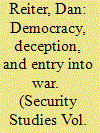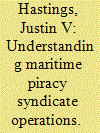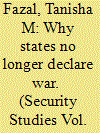|
|
|
Sort Order |
|
|
|
Items / Page
|
|
|
|
|
|
|
| Srl | Item |
| 1 |
ID:
116240


|
|
|
|
|
| Publication |
2012.
|
| Summary/Abstract |
Realists propose that elected leaders that seek war but face a hesitant public may use deception to build public support for war. Leaders may secretly make provocative diplomatic or military moves to push the adversary to attack first, rallying the public behind a war effort seen as defensive, or publicly exaggerate the threat posed by the adversary. This paper develops a liberal institutionalist critique of this theory, positing that elected leaders are deterred from engaging in such deception because democratic political institutions such as political competition, a professionalized military, and the marketplace of ideas increase the likelihood that such moves will be exposed, and once exposed, deceptive politicians will suffer domestic political punishment. The paper examines the thesis that Franklin Roosevelt sought to provoke Germany and Japan to war in 1941, finding little support. It also finds that in general autocratic leaders are more likely than elected leaders to deceive.
|
|
|
|
|
|
|
|
|
|
|
|
|
|
|
|
| 2 |
ID:
116241


|
|
|
|
|
| Publication |
2012.
|
| Summary/Abstract |
This study examines whether democracies are better able to maintain commitments, focusing on the abandonment behavior of states in times of war. It argues that democracies are better able to maintain their wartime commitments because of the effective veto players within democratic polities and the practice of and respect for institutionalized decision-making procedures. This argument is tested with a statistical analysis of the wartime commitment model and illustrated with a historical case study. As expected, this study finds that democracies are less likely to abandon their partners during war and shows that the effectiveness of veto players is the important causal mechanism driving the main finding. Additional results of this study are that war duration, the expectation of victory, the size of the coalition, and the presence of the United States systematically affect the likelihood of abandonment, while domestic leadership changes, formal alliances, and other major powers do not have an effect.
|
|
|
|
|
|
|
|
|
|
|
|
|
|
|
|
| 3 |
ID:
116242


|
|
|
|
|
| Publication |
2012.
|
| Summary/Abstract |
This article explains the establishment of the European Union's Security and Defense Policy (esdp) in 1998-99 and its institutional design. I argue that both the soft balancing explanation and the "second wave" of approaches fall short. In contrast, the article shows that liberal-institutionalist thought and transaction costs economics offer a heuristically promising perspective. Most crucially, the pivotal concept of asset specificity provides explanatory leverage. The combination of risks of opportunism and the non-specificity of esdp's ultimate assets explains why and how the major European powers designed the eu's security and defense pillar in 1998-99. Empirically, I trace how the United Kingdom and France were gradually confronted with not fully credible commitments within nato for crisis management in Europe. Based primarily on the signals sent by us domestic politics, they were increasingly concerned about isolationism and questioned the American commitment to European security. Therefore, they were searching for another institutional option for providing security on a long-term basis. Although this assessment of ex post transaction costs triggered the initial establishment of esdp, ex ante transaction costs were responsible for its more specific design. Given the indirect American threat of disengagement when faced with Europe's aspirations for autonomy, esdp had to be designed in a compatible way with nato. Non-specific, and thus redeployable, military assets represented the institutional solution to the conflict between European autonomy and NATO's primacy. In other words, asset specificity as the key analytical concept of transaction costs economics is what differentiates this argument from previous accounts and provides a more comprehensive framework for understanding both the establishment and design of esdp in 1998-99.
|
|
|
|
|
|
|
|
|
|
|
|
|
|
|
|
| 4 |
ID:
116243


|
|
|
|
|
| Publication |
2012.
|
| Summary/Abstract |
In this article, I explain maritime piracy syndicates' structure and behavior as based on two required inputs: the time needed between an attack and the realization of profit, and access to certain economic and security goods, namely a secure environment and market infrastructure. Pirates face two challenges. Internally, they must keep the organization together during the operation, a challenge I examine with a principal-agent framework to show how the inputs shape the security and control tradeoffs that exist, or not. Externally, pirates must maintain access to the external resources necessary for the success of their operation. I then turn to the adaptations in internal structure, targeting, and network connections that different types of pirate syndicates make to resolve principal-agent problems and external resource access problems during operations.
|
|
|
|
|
|
|
|
|
|
|
|
|
|
|
|
| 5 |
ID:
116239


|
|
|
|
|
| Publication |
2012.
|
| Summary/Abstract |
Why have states stopped issuing declarations of war? Declaring war was a norm of international politics for millennia, but now appears to have exited states' behavioral repertoires. I argue that the proliferation of codified jus in bello, the law of war governing belligerent conduct, has created disincentives for states to issue formal declarations of war. The increasing number of codified international laws that govern belligerent conduct during warfare has made complying with the laws of war extremely costly. One way for states to limit these costs is to avoid admitting they are in a formal state of war by refraining from declaring war. I test this claim, as well as others, using an original data set. I also discuss several cases of nineteenth and twentieth century wars that illustrate the logic of this argument.
|
|
|
|
|
|
|
|
|
|
|
|
|
|
|
|
|
|
|
|
|